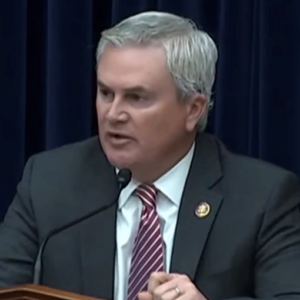A top congressional Republican has a warning for the Biden administration: When it comes to regulating e-cigarettes, don’t put politics ahead of science, particularly with American lives at risk.
In a letter to Food and Drug Administration Commissioner Robert Califf, House Oversight Committee Chairman James Comer (R-Ky.) said his committee has “deep concerns” that the agency has been “influenced by political concerns rather than scientific evidence” in regulating tobacco and nicotine products.
At issue is the agency’s Center for Tobacco Products (CTP), whose mission is — or critics argue, should be — helping Americans stop smoking cigarettes. One strategy is to clear lower-risk alternatives, like e-cigarettes and vapes, for sale in U.S. markets to help adult smokers quit. Instead, Comer wrote, “CTP appears to be unable to perform its basic functions and ensure that Americans have access to products that have the potential to lower the rate of smoking-related disease and death.”
E-cigarettes first hit U.S. markets in 2006. Comer’s letter notes that since 2005, the percentage of adults using nicotine has fallen from 20.9 percent to 12.5 percent. Still, there are 30 million adult smokers in the country, and nearly 500,000 Americans die from smoking-related diseases each year.
Michael Siegel, a professor of Public Health and Community Medicine at Tufts University, said four million adult smokers have successfully quit using nicotine because they switched to vaping products.
“If these products are taken off the market, many of those ex-smokers are going to return to smoking,” Siegel said, adding regulators may be reacting to pressures from organizations adamantly opposed to vaping. “Their beliefs aren’t informed by the science but by hysteria. There’s no evidence that [vaping] causes kids to start smoking or causes harm. The idea that we’re introducing a new generation of kids to pick up cigarettes is simply not born out by the science.”
Kim Murray, a research fellow for the Taxpayers Protection Alliance’s Consumer Center, said the CTP has been under “tremendous pressure” to take some kind of action against vaping products from health activist groups that sometimes portray e-cigarettes as being just as risky as traditional cigarettes.
“The results are an unbalanced debate fostered by misinformation and moral panic on one side and the science demonstrating the value of tobacco harm reduction products on the other,” Murray said. “Due to the moral panic over youth use and the false claim that there’s an ‘epidemic,’ the FDA is being pressured to complete a monumental task faster than they can. This forces them to not look at all the science and only consider one side when determining what is appropriate for the protection of public health.”
Comer pointed to a recent evaluation of CTP’s performance by the nonpartisan Reagan-Udall Foundation (RUF), which found CTP has not clearly set out the most basic elements of its tobacco and nicotine regulatory programs. The RUF report also quoted FDA staffers alleging that “[i]n cases where reviews are finished, and scientific decisions are made, they are also overruled by political agendas and pushed to change decisions.” Another FDA employee said, “scientific disagreement is frowned upon if not entirely suppressed,”
Public health expert Clive Bates said Comer’s letter is a “very significant move.”
“With around 3,000 cigarette brands on the market largely untouched by its burdens and bureaucracy, FDA has been using and abusing its powers to squeeze the life out of much safer alternatives,” Bates said. “It has been erecting excessive, arbitrary or selective barriers to entry and, under the false pretext of protecting youth, implementing a de facto ban on products not flavored with tobacco.”
Bates added the agency could “wipe out” vape shops that function as “stop-smoking centers” while allowing nicotine manufacturers to flourish.
According to Comer’s letter, more than eight million Premarket Tobacco Product Applications necessary to get an FDA marketing order for a new tobacco product have yet to be processed due to a lack of “clearly defined decision-making criteria.” More than 30 companies have filed legal actions against the agency.
“Some applicants contend FDA’s decisions were arbitrary and capricious because of the FDA’s ‘failure to promulgate rules governing the [PMTA] process, or otherwise to announce ascertainable standards,’” Comer wrote.
Comer’s committee wants to see documents and data on the CTP’s performance and its guidance to the industry by April 11.
“We have deep concerns that CTP’s decisions have been influenced by political concerns rather than scientific evidence,” Comer wrote. “Indeed, stakeholders described having to guess what CTP’s policies might be since they were not clearly expressed through regulation or guidance. This lack of transparency by CTP results in substantial market uncertainty, the proliferation of unregulated products, and enforcement failures.”
Please follow DVJournal on social media: Twitter@DVJournal or Facebook.com/DelawareValleyJournal


